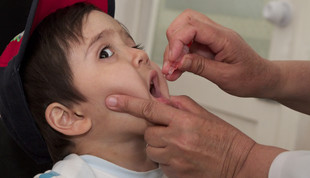Un- or under-immunized travellers from polio-infected areas to receive polio vaccine boost

The current poliomyelitis (polio) outbreak in the Syrian Arab Republic and remaining polio-endemic countries (Afghanistan, Nigeria and Pakistan), as well as frequent population movements and vaccination gaps in some European countries, increases the risk of the international spread of wild poliovirus. As long as the virus is circulating in the world and vaccination coverage is not optimal, polio threatens to return to the WHO European Region.
Large-scale immunization campaign in the Syrian Arab Republic
In response to the outbreak, the Syrian Arab Republic has launched large-scale supplementary immunization activities to vaccinate more than 1.3 million children against polio (and measles, mumps and rubella) in both government-controlled and contested areas. Further campaigns will be needed to interrupt transmission in infected areas during the next 6 months. Neighbouring countries, including Turkey, have begun planning and implementing supplementary immunization campaigns as part of a multicountry response to prevent the international spread of polio.
WHO’s travel and health advice for polio
WHO’s publication “International travel and health” recommends that all travellers to and from polio-infected areas be fully vaccinated against polio. Countries receiving travellers from polio-infected areas or accommodating people displaced by the Syrian Arab Republic’s conflict should identify anyone who is un- or under-immunized, or with unknown immunization status, and provide him/her with missing doses of polio vaccine according to the national schedule of the country of origin. High immunization coverage against polio across age groups and high-quality surveillance – i.e. acute flaccid paralysis (AFP), environmental or enterovirus (the group of viruses including the poliovirus) surveillance – are essential factors for early alert and all-population protection against polio.
As to resident populations, any vaccination gaps for polio should be checked and all missing vaccine doses provided. Only ensuring that every local community has high vaccination coverage can avert the risk of wide polio spread in case the virus is imported.
Annual review of polio status in the WHO European Region
The European Regional Commission for the Certification of Poliomyelitis Eradication, an independent panel of international public health experts, conducts annual reviews of the risk of local transmission and potential outbreak following importation of poliovirus in countries in the WHO European Region. The evaluation is based on the level of population immunity and ability to detect poliovirus, as well as other factors that indicate the capacity to detect and respond to importation in a timely manner. Releasing its latest report in May 2013, the Commission called for significantly greater efforts in the Region to maintain its polio-free status (declared in 2002) until global polio eradication is achieved.



